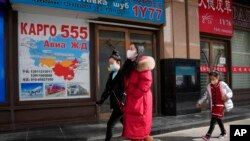China refused to join its close friend, Russia, in vetoing a U.S.-backed resolution in the U.N. Security Council deploring Russia's attack on Ukraine.
China abstained on the motion but also made statements that could be extremely disappointing to Moscow. Zhang Jun, China’s U.N. ambassador, called for respecting the sovereignty and territorial integrity of Ukraine as it was being violated by Russia.
“Ukraine should become a bridge between the East and the West, not an outpost for confrontation between major powers,” Zhang said. However, he also called for understanding Russia’s fears about NATO attempts to expand and include Ukraine as a member.
China has been using this argument about sovereignty and territorial integrity in rejecting foreign comments and opinions about trouble spots such as Tibet, Xinjiang and Hong Kong. It has also used this argument to oppose the presence of U.S. troops in Afghanistan.
"Russian annexation of portions of Ukraine, or invasion and seizure of Kiev, violate China's position that sovereignty is sacrosanct," John Culver, a former U.S. intelligence officer said on Twitter.
Cold feet
China’s decision to take a neutral stance on the invasion of Ukraine raises several questions. Did Beijing develop cold feet at the last moment, or did Russia go much further in its military aggression in Ukraine than China had expected?
“The unity and strong resolve of Western countries to isolate Russia is a matter of surprise. China needs to feel the pebbles and carefully walk through the stream,” a senior journalist with state-run Chinese media said while requesting not to be named.
Just a few days ago, Chinese experts had said there was no way Europe would back U.S. proposals against Russia because it was heavily dependent on Russian gas.
Europe’s ability to shun Russia “depends on the extent to which the US is able to replace Russia's natural gas exports,” Cui Hongjian, director of the Department of European Studies at the China Institute of International Studies, told the state-owned Global Times.
Now that Europe has overcome any hesitation and moved to stop further aggression from Russia, Beijing will be concerned about the more stringent financial sanctions imposed on Moscow, such as the ban on the international operations of the Russian central bank and the cutting Russia out of the SWIFT international fund transfer system.
As the world’s biggest trader, China has strong reasons to worry about being bracketed with Russia, particularly because many Chinese banks have close dealings with Russian financial companies. The stakes are also high for Chinese companies, as 254 of them are listed on U.S. stock exchanges.
For years, China has been trying to take advantage of differences between Washington and Europe. For instance, it has pushed for wider investment opportunities in Europe after the U.S. made it difficult for Chinese companies to buy corporate assets in areas related to security and high technology.
As the biggest importer of crude oil, it is China that will pay a heavy price due to the rise in oil prices, which have touched $100 per barrel. Russia is the second-largest source of oil for China, after Saudi Arabia.
China could face serious difficulties in buying Russian crude after Russia’s ouster from the international payments system, although Russia and China have been working on a payments process that does not require access to SWIFT for bilateral trade.
Domestic opinion
Within China, almost no one would accept the idea that Chinese authorities, known for taking a long-term view of situations, could have miscalculated or developed cold feet.
But there are signs that Putin did not reveal the full extent of his planned actions to Xi.
The New York Times reported that American intelligence had shared information about Russian preparedness to invade Ukraine with Chinese officials but the latter had rejected the possibility. U.S. officials calculated that China had a lot to lose in a Russian war on Ukraine and hoped Beijing might use its influence on Moscow to stop a direct invasion.




